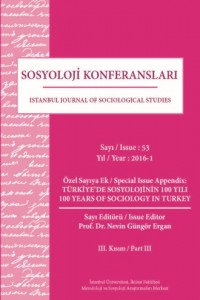Abstract
Sociology producing solutions for the problems of the modern societies in the West provides
formulas for the modernization and the torment coming along with the modernization in
Turkey. Starting with the Tanzimat Reform era in the Ottoman period, the modernization
had to call the Christian West -which had been ‘the other’ for centuries and a historical
actor that we had to struggle against- as ‘the great powers’ and put great effort in catching
up with them. However, the intellectuals in the Tanzimat Reform era, Constitutional era,
and early Republican era avoided from calling this process as the ‘Westernization’. In the
early Republican period, Turkish sociology began to measure the Turkish modernization
while discussing the concept of the sociology and Turkish Revolutions. Following the
declaration of the Republic, the intellectuals began to prepare a scientific ground for the
Republic and the revolutions and set an ideological ground for the Turkish revolution.
The topics for discussion were firstly explaining why we fell behind by describing the
West and us, and then what we succeeded with the Turkish revolution. In this period, the
modernization was minimized to industrialization and development, which made becoming
‘Western’ possible in a pragmatist and short way. The politics was the hot discussion
topic which left no occasion to discuss the problems of the Turkish civil society that has
quickly embraced the technology and the concepts which were not created by them. In the
post-1980 period, Turkish sociology leaned toward the cultural problems of modern society
triggered mostly by the capitalism on account of the global economic dynamics. The
West was re-modernizing in a different manner and Turkish sociology was struggling to
keep up with it. Globalization replacing the modernization was the topic for discussion in
Turkish sociology. With the questioning of modernization and nation-state and pre-nation
identities becoming visible in the public area, the sociology -the science of nation-state-
started to discuss the transnational and the national components. This article studies how
Turkish modernization took its shape in the historical transformation process of Turkish
sociology trapped between universality and locality, within the frame of magazines where
the intellectuals expressed themselves better both within and outside the academic arena.
Abstract
Batıda gelişen modern toplumların sorunlarına çözüm üreten sosyoloji, Türkiye’de modernleşmenin sancıları ve modernleşmeye dair reçeteler sunmaktadır. Tanzimat’la başlayan modernleşme, yüzyıllarca ötekimiz ve tarihsel mücadele aktörümüz olan Hıristiyan Batıya düvel-i muazzama demek zorunda kalarak, ona yetişmek için ortaya konan çabalar olsa da; Tanzimat, Meşrutiyet ve Erken Cumhuriyet döneminde aydınlar, yaşanan sürece Batılılaşmak demekten kaçınmışlardır. Erken Cumhuriyet döneminde, Türk sosyolojisi Türk modernleşmesini ölçmeye başlarken aynı zamanda sosyolojinin kavramları ile Türk Devrimleri tartışılmıştır. Cumhuriyetin ilanından sonra Cumhuriyete ve devrimlere ilmi bir zemin hazırlamanın peşine düşen aydınlar, Türk devrimine ideolojik bir zemin hazırlamıştır. Tartışılan konular, öncelikle Batıyı ve bizi tanımlayarak neden geri kaldığımızı açıklamaktır, daha sonra ise Türk devrimleri ile neyi başardığımız anlatılmıştır. Bu süreçte, modernleşmenin sanayileşme ve kalkınmaya indirgenmesi, pragmatist bir şekilde kısa yoldan Batılı olmayı mümkün kılmaktadır. Kendi yaratmadığı teknolojileri ve kavramları hızlı bir şekilde içselleştiren Türkiye’de sivil toplumun sorunları siyasetten fırsat bulunup tartışılamamaktadır. 1980 sonrasında, küresel ekonomik dinamikler sebebiyle, Türk sosyolojinin yönelimi artık genel olarak kapitalizmin tetiklediği modern toplumun kültürel sorunlarına ilişkindir. Batı yeniden farklı bir şekilde modernleşmekte ve Türk sosyolojisi de buna ayak uydurmaya çabalamaktadır. Artık modernleşmenin yerine küreselleşme, Türk sosyolojisinin temel tartışma konusudur. Modernlik ve ulus-devletin sorgulanması ve ulus öncesi kimliklerin kamusal alanda görünür olmaya başlamasıyla, ulus-devletin bilimi olan sosyoloji ulusun ötesindekini ve ulusun bileşenlerini tartışmaya başlamıştır. Bu çalışmada; temel sorunu, evrensellik ve yerellik arasına sıkışmışlık olan Türk sosyolojisinin tarihsel değişim sürecinde Türk modernleşmesi ile nasıl biçimlendiği, akademi içinde ve akademi dışında entelektüellerin kendilerini daha rahat ifade ettiği dergiler çerçevesinde ele alınacaktır.
Details
| Journal Section | HISTORY OF SOCIOLOGY IN TURKEY |
|---|---|
| Authors | |
| Publication Date | July 4, 2016 |
| Published in Issue | Year 2016 Issue: 53 |


